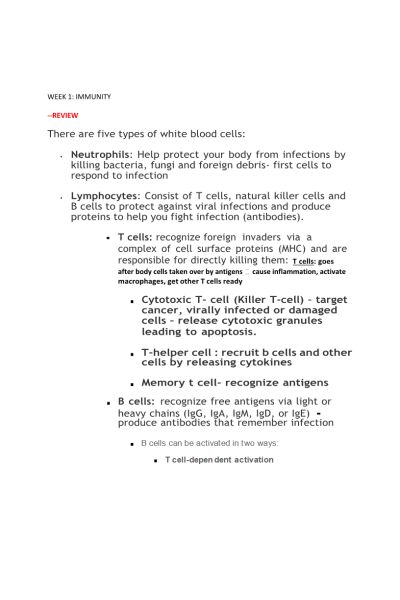NR 507 Week 1 Assignment; Immune Response (Edapt)
-
$20.00
| Institution | NR 507 Advanced Pathophysiology |
| Contributor | Laura Palmer |
WEEK 1: IMMUNITY --REVIEW
There are five types of white blood cells:
- Neutrophils: Help protect your body from infections by killing bacteria, fungi and foreign debris- first cells to respond to infection
- Lymphocytes: Consist of T cells, natural killer cells and B cells to protect against viral infections and produce proteins to help you fight infection (antibodies).
- T cells: recognize foreign invaders via a complex of cell surface proteins (MHC) and are responsible for directly killing them: T cells: goes after body cells taken over by antigens à cause inflammation, activate macrophages, get other T cells ready
- Cytotoxic T- cell (Killer T-cell) – target cancer, virally infected or damaged cells – release cytotoxic granules
- T-helper cell : recruit b cells and other cells by releasing cytokines
- Memory t cell- recognize antigens
leading to apoptosis.
- B cells: recognize free antigens via light or heavy chains (IgG, IgA, IgM, IgD, or IgE) à produce antibodies that remember infection
- B cells can be activated in two ways:
- T cell-dependent activation
- B cells can be activated in two ways:
- B cells absorb the antigen à present pieces of the antigen via a major histocompatibility complex (MHC) à Helper T cells activate the B cells -> B cell
proliferation, immunoglobulin class switching and sustains T-cell growth/differentiation.
- T cell-independent activation à B cell must both encounter an antigen and receive a “danger
signal,” which is a signal that an attack is occurring.
- Activated B cells can then either become effector B
cells or memory B cells.
- Effector B cells = plasma cells, produce antibodies. Antibodies work as tags or alarms to target invading agents for destruction by other immune agents like macrophages.
- Memory B cells help the immune system respond more quickly to future invasions by the same agent.
When a naïve or memory B cell is activated by an antigen, it proliferates and differentiates into an antibody- secreting effector cell, known as a plasmablast or plasma cell................ Continue
| Instituition / Term | |
| Term | Year 2022 |
| Institution | NR 507 Advanced Pathophysiology |
| Contributor | Laura Palmer |





































